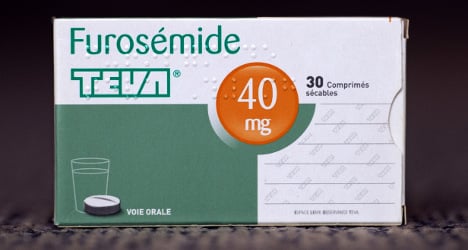France's health regulator on Monday recalled a diuretic used to control high blood pressure after some packets of the drug were found to contain sleeping pills – a mistake feared linked to two deaths.
Stressing this was a precautionary measure, the ANSM regulatory agency urged people to return all boxes of Furosemide Teva 40 mg to their pharmacists.
The agency suspended sales of two batches of the drug last Friday after a pharmacist reported sleepiness in a patient.
Prosecutors opened a probe the following day after the death of a nonagenarian in the southern city of Marseille. A box of the pills from one of
two contaminated batches was found at the patient's house.
On Monday, the ANSM reported another death and one person falling ill, and said one of them had been taking the same medicine.
The agency did not specify which one of the patients, nor why it linked the other person to the case.
"Other reports are being investigated," it added.
The agency urged people to return the medicine to their pharmacist "as soon as possible" – regardless of the lot number, to be replaced by another brand.
Furosemide Teva 40 mg is a diuretic used to treat water retention in people with congestive heart failure and disorders of the liver, kidney and lung.
The drug works by increasing the amount of urine produced and excreted, and removing excess water in the body. It is also used for high blood pressure.
France has had a series of medical scares since it emerged domestic company PIP had produced breast prostheses containing industrial-grade silicone gel.
An estimated 300,000 women in 65 countries are believed to have received faulty implants.
Last month, it was revealed that French surgeons had fitted 1,300 people with replacement hips not certified as meeting European standards.
Also in May, an EU medicines watchdog endorsed the safety of acne drug Diane-35, also widely used as a contraceptive, despite France suspending use of the drug which it linked to four deaths from blood clots.
France is also behind a European probe of the safety of third- and fourth-generation birth control pills, associated with a higher risk of potentially deadly thrombosis.
In April, France called for Europe-wide controls on a paper product containing bisphenol A after a domestic watchdog agency said the chemical widely used in plastic bottles and the linings of food cans may expose unborn children to breast cancer.



 Please whitelist us to continue reading.
Please whitelist us to continue reading.
Member comments